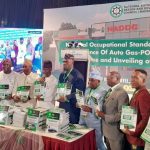The Nigerian government has reiterated its commitment to sustainable energy policies within the automotive sector, focusing on alternatives like compressed natural gas (CNG) and electric vehicles (EVs). This was highlighted at the 9th Annual Training Workshop organized by the Auto Journalists Association (NAJA) in Lagos, themed “CNG/LPG/EV Initiative: Challenges, Sustainability, Opportunities, and Alternatives to Fossil Fuels in Nigeria.”
Speaking at the event, Joseph Osanipin, Director-General of the National Automotive Design and Development Council (NADDC), and Engr. Michael Oluwagbemi, Chief Executive of the Presidential Initiative on Compressed Natural Gas (PICNG), emphasized government efforts to address Nigeria’s energy and environmental challenges. Represented by Ikechukwu Okoha, Assistant Director of Press and Protocol at NADDC, and Olayinka Rufai, Strategic Project Advisor at PCNGi, the officials underscored ongoing initiatives to reduce dependency on fossil fuels through alternative energy adoption.
Osanipin detailed NADDC’s role in fostering cleaner energy in the automotive sector by promoting CNG and EVs. He noted that NADDC is establishing standards for autogas-powered vehicles, converting government fleets to CNG, and setting up automotive training centers nationwide. These steps, he stated, will ensure Nigeria remains a leader in sustainable automotive practices while addressing energy security and environmental impacts. “NADDC is pivotal in driving sustainable energy forward in Nigeria’s automotive industry by providing technical expertise and supporting innovation,” Osanipin said.
Oluwagbemi further highlighted the economic and environmental significance of CNG adoption, noting it aligns with Nigeria’s energy goals and economic vision. “Transitioning to CNG is a monumental step for Nigeria, offering a cost-effective and environmentally friendly energy source,” he remarked.
NAJA Chairman Mike Ochonma, welcoming attendees, stressed the workshop’s importance, particularly as fuel costs continue to impact Nigerians. Ochonma emphasized that while CNG is the President’s primary focus for sustainable transportation, other options like EVs and LPG are also under consideration. “CNG offers a safe, affordable, and eco-friendly alternative to petrol, and we, as journalists, are here to inform the public that this shift has come to stay,” he stated.
The workshop aimed to equip journalists with the tools needed to inform the public on Nigeria’s shift toward sustainable automotive solutions, a necessary step as the nation works to curb transportation costs and environmental impact.










